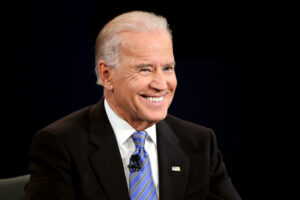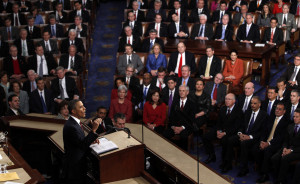
No, I don’t mean that kind of “coming out.”
However, I do mean that the president of the United States will step onto a significantly larger stage than ever before. The podium will be of, oh, standard size, I guess. He’ll be standing tonight in front of a joint congressional session. The vice president and the speaker of the House of Representatives will sit behind him.
The speaker will declare that “it is my high honor and privilege to introduce the president of the United States.”
Applause will fill the room. Donald J. Trump will begin his speech.
That’s when the pomp and pageantry ends and when we get a look at just how much he’s been able to “unify” the body to which he is speaking, let alone the country.
I don’t know about you but I’m going to look at a few external factors as Trump speaks … assuming, of course, that I can power through the entire event.
The Supreme Court justices will be there. Who among them will sit this one out? When Trump’s immediate predecessor spoke to these joint sessions, a couple of the court’s conservative justices — the late Antonin Scalia and Clarence Thomas — famously were no-shows. One or both of them said they disliked having to sit there while everyone around them were clapping and cheering.
President Obama famously scolded the court for its 2010 ruling enabling corporations to give unlimited amounts of money to political candidates. The justices had to take it. Personally, I thought the president was wrong to do so in that venue and it surely rankled the court majority that decided the infamous Citizens United case.
Who’s going to stay away from Trump’s speech? Will it be, say, one or two of the court’s liberal justices?
Who stands and claps and who sits? This is a fairly normal occurrence. Lawmakers of the president’s party usually clap and cheer at everything that comes out of the president’s mouth; those on the other side don’t.
Republicans didn’t much cheering for Barack Obama during the eight years he spoke to joint sessions. I rather doubt Democrats will, either, when Trump stands before them.
His defense-spending boost will be a big topic. He wants to spend $54 billion more on defense, ostensibly to “rebuild our military.” At what cost? Which domestic programs get the axe? Which Americans will feel the pain? Maintaining military strength usually is a non-partisan/bipartisan issue. Something tells me when the president gets around to that one, we won’t see much cheering from Democrats.
Will the president veer off topic? He’ll have a Teleprompter in front of him. He’ll be reading a prepared text. I have to wonder if Trump is going to be tempted to take off on one of his vaunted campaign-style riffs and rants about, oh, the size of his Electoral College victory, or about the “fake news” he says is being peddled by the “mainstream media.”
I don’t expect to hear the names “Michael Flynn” or “Vladimir Putin” come from the president’s mouth. I don’t expect either to hear him say the word “Russia.” Nor do I expect him to talk about things such as the difficulty he is having assembling his government; key appointees keep dropping out for one reason or another.
But let’s get ready — ladies and gents, boys and girls — for an interesting show this evening, shall we?
Pass the popcorn … and the Pepto.



